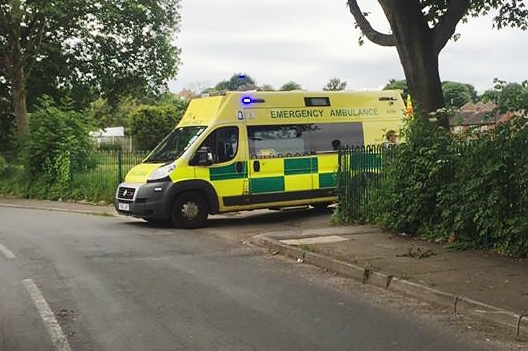Telephone advice from the ambulance service helps patients receive care closer to home
Date published: 23 April 2019

Ambulance
Almost 80,000 people across the North West avoided an unnecessary trip to hospital last year thanks to enhanced telephone assessment and advice from the ambulance service.
The North West Ambulance Service (NWAS) has expanded its Clinical Hub, which is a team of clinicians with various areas of expertise. These clinicians assess patients on the telephone and provide self-care advice or arrange for them to get the care they need in the community when safe to do so, avoiding an unnecessary trip to hospital.
As part of its two-year ‘Transforming Patient Care’ programme, which began in summer 2017, NWAS focused on introducing initiatives to make sure patients who called 999 but did not need immediate or emergency hospital treatment and could receive the right care and support in the community.
This included developing the 24/7 Clinical Hub to have more clinicians – including paramedics, nurses, mental health practitioners and clinical pharmacists - available to offer support to people who need clinical assistance but do not require an ambulance. This is known as ‘hear and treat’.
In 2018/19, NWAS was able to provide ‘hear and treat’ support in 38,000 more incidents than the previous year, reducing the number of people taken to hospital in an emergency ambulance. Despite an overall increase in 999 incidents year-on-year, almost 39,000 fewer patients were taken to hospital by NWAS in 2018/19 following the introduction of Transforming Patient Care.
As well as enabling patients to stay at home in many cases and avoid an unnecessary trip to hospital, this approach helps to keep emergency ambulance resources free to respond quickly to those who have life-threatening illnesses or injuries. The decrease in the number of people taken to hospital is estimated to have freed up more than 19,000 hours of emergency ambulance time.
Mark Newton, who leads Transforming Patient Care, said: “We’re committed to delivering the right care, at the right time, in the right place for North West residents and, depending on your symptoms, this doesn’t always mean an emergency ambulance to hospital.
“To meet the rising demand on our service, we should only send an ambulance when it is clinically required and not everyone who calls 999 needs an emergency ambulance response. The expansion of the Clinical Hub, along with other improvements under the Transforming Care Programme, has increased our capability to manage this demand by helping to keep our emergency resources available to respond to life-threatening incidents while still delivering high quality care to patients with less urgent needs. Avoiding unnecessary hospital trips also helps our colleagues in other parts of the NHS, by reducing pressure on busy A&E departments.
“It’s important to highlight that in many cases, the Clinical Hub will refer patients to other services in the community which is something individuals may have been able to do more quickly themselves. Therefore we ask members of the public to consider carefully which health service would be most appropriate to help them before dialing 999 – if the problem is not a life-threatening emergency, please visit 111.nhs.uk, call 111, or speak to a GP or pharmacist for advice. This helps us keep 999 free for the most serious incidents.”
Other Transforming Patient Care initiatives contributed to an increase of 6,600 people last year receiving ‘see and treat’ support, which is when NWAS clinicians will attend, assess the patient face-to-face, and deliver the right care on scene or refer them on to an alternative community-based care service. These initiatives included:
- A pilot of paramedics and nurses in a new Urgent Care Practitioner role which responds to less urgent incidents in a non-emergency vehicle equipped to ‘see and treat’. This means care for the patient is delivered where they are or a referral is made to an alternative local community health or care service.
- Additional training delivered to more than 90% of all paramedics and emergency medical technicians to support them to triage patients more effectively on scene and understand the best alternative service in the area for their needs.
Do you have a story for us?
Let us know by emailing news@rochdaleonline.co.uk
All contact will be treated in confidence.
Most Viewed News Stories
- 1Royton haulage firm fined after Rochdale dad went to work and didn’t come home
- 2Rochdale church to host Camerados public living room
- 3Unique colour and sound experience comes to Rochdale in May
- 4Suspended council candidate was ‘politically naive’ for appearing in George Galloway video, leader...
- 5Community support needed for funding bid to repair viaduct on East Lancashire Railway route
To contact the Rochdale Online news desk, email news@rochdaleonline.co.uk or visit our news submission page.
To get the latest news on your desktop or mobile, follow Rochdale Online on Twitter and Facebook.


